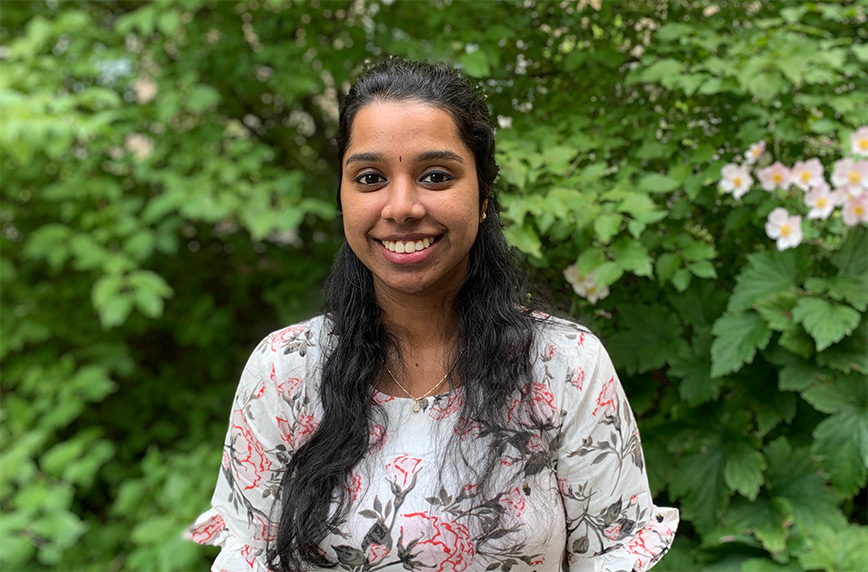Bhuvaneshwari
Bhuvaneshwari comes from Tamil Nadu, India. At KTH, she is studying master's in Nanotechnology. She did her bachelor's in Electronics and Communication Engineering from RMK Engineering College. In her free time, she loves playing the veena, which is a traditional Indian string instrument. As an extrovert, she loves to explore places and diverse cultures.

Why did you choose this master’s programme at KTH?
I have always been fascinated by the evolution of technology and aspired to have a career in this domain. This drove me to pursue my bachelor's in Electronics and Communication. After my bachelor's degree and internship at the Indian Space Research Organisation, I thought a master's programme would augment my fundamental knowledge and give me an edge above the rest. I wish to attain qualities and update myself in technical areas, carry out independent research and handle the ever-evolving multidisciplinary technological challenges through my master's. I found KTH, a top-ranked university, to be the right destination to delve into the prospective field of Nanotechnology. So far, my courses have helped me procure comprehensive knowledge of various nanoscale devices and fabrication methods and set me on my desired career path.
What are the best aspects of your programme?
The programme's highlights are the two specialisation tracks, Nanomaterials and Nanoelectronics. The courses are very flexible, where we can choose subjects from either tracks or a combination of both. You can also select courses from other departments based on your interest. The professors are subject matter experts, providing you with the right insights and support with technical guidance. They can even help by providing information on internship opportunities.
This programme includes many technical group activities that help you think about different concepts taught in lectures from other perspectives. You have the chance to work independently and look over the theories in the lab courses, providing an experimental foundation and conceptual approach to theoretical concepts.
Have you chosen a specialisation track within the programme?
Yes! Since I want to work as an R&D engineer in the field of nanoelectronics, I have chosen the Nanoelectronics track. I am more at ease working with electronics and fabrication because of my expertise in electronics. This is my area of interest, and I want to explore R&D learning and applications.
How do studies at KTH differ from your previous studies?
KTH has a different educational system than my previous institution. The programme is flexible and adaptive to the interest of students. It helps to decide the courses I want to take and how I want to develop my profession. Learning is more experiential and application based.
The semesters here are divided into two periods that help to focus on topics independently, and most of the grading is based on quizzes, assignments or oral exams. Due to the 15:1 student-to-faculty ratio, professors are easily approachable, help us to explore the topics with discussions and are prompt in their responses to questions. At any point, if I require more support, I can take the professor's help without hesitation. I noticed that the grading structure is also different and that it is up to the faculty to decide on it based on the overall student ability and efficiency.
How is student life in Stockholm?
As a country, Sweden is stunning! The Swedes are warm and welcoming, and the entire country is multi-cultured in terms of climate, population and landscapes. Stockholm, its capital, is the home of the Nobel Prize, the Swedish Royal family, breathtaking architecture and lovely nature.
Stockholm is a well-connected city, and thanks to the reliable public transport network, there's no hassle to travel. Networking with people is easy as most of them understand and speak English. Student discounts on books, electronics, food, travel and more make a student's life pocket-friendly. Here, one's social life is given equal importance as academics. With the diverse culture in Stockholm, it is easy to make friends. I usually love to spend time outdoors in the city's lovely green spaces. Visiting the museums in Stockholm is worth a shot.
On the other hand, you can experience the city's nightlife with eclectic cafes. It has been a year since I arrived in Stockholm, yet I'm still exploring the beauty of it. It is easy to get adapted to this inclusive city.
How would you describe your time at KTH so far?
My experience at KTH has been fantastic from day one. I was captivated by everything, the Student Union, the friendly greetings of the students and the stunning architecture and layout of the campus. Exploring Swedish culture and heritage while celebrating Indian festivals feels like a home away from home. By participating in events organised by THS, I meet students from many cultures, make memories with them, and pick up positive ideals from them. Attending several lunch seminars is academically insightful in addition to the course lectures.
What do you want to do after graduating?
I'm determined to gain industrial experience in the field of Nanoelectronics, ideally as an R&D engineer in a company that encourages me to do my best.
What would you like to say to students considering choosing KTH for master’s studies?
KTH is one of Sweden's top technical universities, ranking 89 in the 2022 QS World University Ranking. The university instils a diverse culture and resonating core values in all its students. A solid industrial orientation that complements academics provides qualified and independent engineers and researchers to society. Suppose you are looking for a place to study where your coursework will be seen from an interdisciplinary and holistic perspective focusing on sustainability – BINGO, this is the right place!

